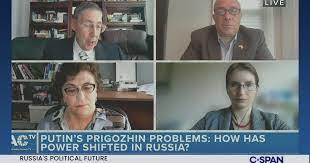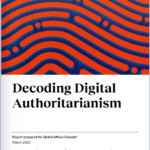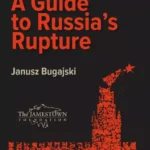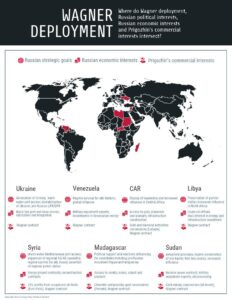 As the war in Ukraine unfolded last year, Russia’s best digital spies turned to new tools to fight an enemy on another front: those inside its own borders who opposed the war, The New York Times reports:
As the war in Ukraine unfolded last year, Russia’s best digital spies turned to new tools to fight an enemy on another front: those inside its own borders who opposed the war, The New York Times reports:
President Vladimir V. Putin is leaning more on technology to wield political power as Russia faces military setbacks in Ukraine, bruising economic sanctions and leadership challenges after an uprising led by Yevgeny V. Prigozhin, the commander of the Wagner paramilitary group. In doing so, Russia — which once lagged authoritarian regimes like China and Iran in using modern technology to exert control — is quickly catching up.
 “It’s made people very paranoid, because if you communicate with anyone in Russia, you can’t be sure whether it’s secure or not. They are monitoring traffic very actively,” said Alena Popova, a Russian opposition political figure and digital rights activist. “It used to be only for activists. Now they have expanded it to anyone who disagrees with the war.”
“It’s made people very paranoid, because if you communicate with anyone in Russia, you can’t be sure whether it’s secure or not. They are monitoring traffic very actively,” said Alena Popova, a Russian opposition political figure and digital rights activist. “It used to be only for activists. Now they have expanded it to anyone who disagrees with the war.”
Russia is also trying to export their digital authoritarianism via international institutions like the U.N.’s International Telecommunication Union, observers suggest.
“We’re concerned about the Russians … pushing their authoritarian digital agenda in every forum around the world,” a senior Biden administration official told The Post’s David Ignatius. “It’s global and relentless, and when we step back even a little bit, they fill that void.” He said the State Department has conveyed its “legitimate concern” about a U.N. “takeover” of internet governance to U.N. officials in New York.
 The authorities are “essentially incubating a new cohort of Russian companies that have sprung up as a result of the state’s repressive interests,” adds Adrian Shahbaz, a vice president of research and analysis at Freedom House. “The spillover effects will be felt first in the surrounding region, then potentially the world.”
The authorities are “essentially incubating a new cohort of Russian companies that have sprung up as a result of the state’s repressive interests,” adds Adrian Shahbaz, a vice president of research and analysis at Freedom House. “The spillover effects will be felt first in the surrounding region, then potentially the world.”
Prigozhin is likely to have won concessions beyond the freedom to move to Belarus, said Abbas Gallyamov, an analyst and former speechwriter for Putin, as the militia leader was negotiating from a position of some strength on the day of the mutiny. “Prigozhin wasn’t physically defeated,” he told The Financial Times:
“He took Rostov, he made his way to Moscow, he could have tried to take the Kremlin. He put the system on the brink of collapse — so of course he wouldn’t be agreeing to a deal in which he loses everything.”…. At the same time, the Kremlin may be treading carefully with Prigozhin because of an acute awareness of weaknesses in the system that were exposed by his mutiny. Any sharp moves against Wagner now could provoke the group, or fire up other actors to rebel, Gallyamov suggested. “The system is so weak right now, anything could be fatal,” he said.
 The developments around Prigozhin, who remains unpunished despite Putin’s labeling of his revolt as treason, underscored what St. Petersburg municipal council member Nikita Yuferev called the “gradual erosion of the legal system” in Russia, The Post reports.
The developments around Prigozhin, who remains unpunished despite Putin’s labeling of his revolt as treason, underscored what St. Petersburg municipal council member Nikita Yuferev called the “gradual erosion of the legal system” in Russia, The Post reports.
Andrei Kolesnikov, senior fellow at the Carnegie Russia Eurasia Center, writing about the mutiny in a column, concluded: “The fabric of the state is disintegrating.”
Mark Galeotti of University College, London, an analyst on Russian security affairs, said the rebellion tested previous assumptions that Putin could count on his security forces.
“Now, the first time there’s a real challenge we actually see, security forces are willing to hang back and wait and see what happens,” he told AP. So far, there has been no negative impact on the FSB, which Galeotti called “Putin’s favored institution,” having been a former member.
 Such a brittle Russia could be headed for Armageddon, adds Alexander J. Motyl, a professor of political science at Rutgers University-Newark. Elite competition will increase and the power struggles will intensify, he writes for The Messenger. The war will go even more badly for Russia than it has hitherto. The economy will worsen, as casualties mount. Putin’s demise appears inevitable. His regime’s collapse is likely, and the state’s disintegration, with possible civil war, are increasingly probable. And it’s perfectly possible that the Wagner forces will, with or without Prigozhin, play a role in that process.
Such a brittle Russia could be headed for Armageddon, adds Alexander J. Motyl, a professor of political science at Rutgers University-Newark. Elite competition will increase and the power struggles will intensify, he writes for The Messenger. The war will go even more badly for Russia than it has hitherto. The economy will worsen, as casualties mount. Putin’s demise appears inevitable. His regime’s collapse is likely, and the state’s disintegration, with possible civil war, are increasingly probable. And it’s perfectly possible that the Wagner forces will, with or without Prigozhin, play a role in that process.
Prigozhin’s Putsch Propped up Putin?
Hopes for major political turmoil in Russia and/or threats to Putin’s iron grip on power, however, may prove premature, according to former Freedom House analyst Arch Puddington and David J. Kramer, Executive Director of the George W. Bush Institute.

Foreign Policy Research Institute
Recent examples in other countries offer reasons for caution. Prigozhin’s failed play for power may lead to a further consolidation of power in Putin’s hands, at least temporarily, they write for The Bulwark. And even if successful, a coup in Moscow may not produce a more benign leadership, though this is not to argue we should root for Putin to stay in power.
The Atlantic Council hosts a discussion (above) with Yevgenia Albats, Resident Journalist, New York University’s Jordan Center for the Study of Russia; John E. Herbst, Director, Atlantic Council’s Eurasia Center; Maria Snegovaya, Senior Fellow, Center for Strategic and International Studies, Russia and Eurasia Program [and former Penn Kemble fellow at the National Endowment for Democracy (NED); and Brian Whitmore, Nonresident Senior Fellow, Atlantic Council.
#Putin’s demise appears inevitable. His regime’s collapse is likely, and the #Russian state’s disintegration, with possible civil war, are increasingly probable, #AlexanderJMotyl @Rutgers_Newark writes for @TheMessenger https://t.co/36dLSD1ftE
— Democracy Digest (@demdigest) July 7, 2023







